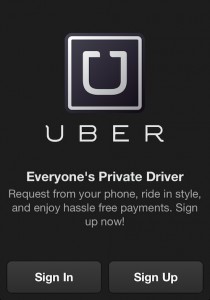Uber: Tech Company of the Year Sparks Legal Controversies
Since 2009, Uber, Inc. has provided fast, affordable, and tech savvy transportation services in major cities. In 2013, Uber was recognized as tech company of the year by a writer for USA Today. However, despite its success, Uber has also sparked a number of legal controversies amongst both cab companies and Uber driver employees.
If you’re unfamiliar, Uber is a new cab-like company that allows users to summon cabs with the push of a button on their smart-phone. The app then enables users to tracks the ride as it approaches, rate the driver, and automatically pays for the ride with whatever credit card the user has on file.
As an extra-bonus to users, the Uber app automatically includes gratuity in the cost of the ride and drivers are not permitted to accept extra cash tips.
Why Are Cab Companies Mad?
Cab companies and taxi drivers are mad because, currently, Uber rides are not subject to the same extensive city regulations as cab companies. This saves Uber the cost of regulation compliance and allows Uber to beat out cab companies with cheaper rates.
The reason for this is “cab companies” are generally regulated by cities while “pre-arranged car services” are only subject to state regulations – which tend to be comparatively minimal.
The main distinction between the two similar services is whether or not the ride can be flagged down on the street. Here, Uber currently still qualifies as a pre-arranged car service because Uber rides can only be summoned via app.
What Regulations Apply to Uber?
In California, the Public Utilities Commission recently adopted a new set of rules for Uber that are similar to those for limousine companies.
These regulations include driver background checks, car safety checks, training programs, and zero-tolerance for drug and alcohol use by drivers. Still, these regulations don’t match up to city regulations of cab companies.
Why Are Uber Drivers Mad?
Recently, Uber also began taking heat from its own drivers. Several months ago, a class action lawsuit was filed on behalf of the drivers citing a number of complaints, including that many Uber drivers don’t enjoy employee status, and that Uber unlawfully skims Uber driver’s tips.
Here, Uber makes money by taking a percentage of the gross proceeds billed by Uber drivers. The Uber drivers are then paid the remaining amount, but are still accountable for their own gas, insurance, and car maintenance.
- Employee Status Issue
Uber classifies many of its drivers as independent contractors rather than employees. As result, Uber saves itself many of the costs and responsibilities associated with employees, including not having to pay for employee gas, insurance, and car maintenance.
However, depending on the actual relationship between Uber and its drivers, the law may step-in and declare that the drivers are employees regardless of how Uber wishes to classify them. When determining whether a worker is an employee or independent contractor, courts will look to a number of factors regarding the autonomy of the worker from the employer.
- Tip Skimming Issue
When Uber takes a percentage of each bill, this includes a percentage of the “gratuity” calculated into the tab. Under most state labor laws, employers are prohibited from sharing in any portion of an employee’s tips. However, this rule only applies if the gratuity actually qualifies as a customer’s “tip” to the driver.
Tips are defined as money a customer leaves for an employee over the amount due. Here, Uber customers aren’t given any option whether or not to pay the included gratuity amount. However, Uber also specifically tells riders that gratuity is included and prohibits drivers from accepting additional cash tips.
Here, because tips are customary in the ride-industry and because Uber restricts customers from tipping outside the required gratuity, I’ll place my bets on the Uber drivers winning this argument and receiving their full share of tips.
What Does this Mean for Uber Riders?
There is certainly merit to the claims made by both cab companies and Uber drivers. However, if either group’s claims are successful, it will increase the company’s cost of operation and may lead to increased fares for Uber rides.
Still, Uber and similar companies like Lyft are paving the way for the future of public street transportation. As time progresses, the law will surely have to catch-up and figure out how best to regulate the operation of this new industry



Comments